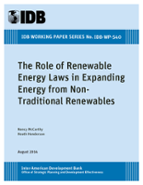The Role of Renewable Energy Laws in Expanding Energy from Non-Traditional Renewables
Date
Aug 2014
Many countries in Latin America and the Caribbean are interested in diversifying their energy sources for energy security and in contributing to the reduction of greenhouse gases. Non-traditional renewable energy (NTRE) sources, which include wind, solar, geothermal and small-scale hydropower, have received a lot of attention towards meeting these goals. To foster the expansion of NTRE, different countries have pursued different legal and regulatory approaches, but there remains very limited evidence regarding the effectiveness of different approaches. In this paper, we use a unique dataset that combines information on NTRE growth rates and information on the legal and regulatory framework, as well as other control variables, for 27 countries over the period 2001-2010. Legal and regulatory instruments include legally binding and non-binding quantity targets, contracts guaranteeing premium prices, fiscal incentives and import duty waivers, and guaranteed access to the grid. Using an information-theoretic Markov Chain analysis, results indicate that fiscal incentives and guaranteed access have relatively high impacts on transitions into high growth rates, whereas fiscal incentives and import duty waivers have relatively high impacts on transitions into moderate growth rates. Binding and non-binding agreements increase transitions out of negative and zero growth rates, but to relatively low positive growth rates. Contracts with premium subsidies also have limited impacts on transitions into high growth rates, though they are associated with transitions into the low growth category. These results provide additional evidence on which regulatory instruments have been most effective in aiding countries in expanding their NTRE.



